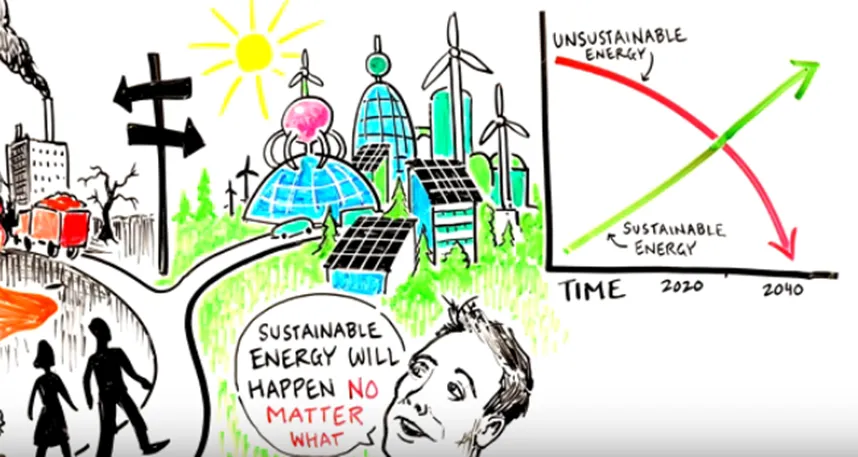Energy is the cornerstone of the economy and renewable energy is an inevitability in our global future. That may sound hyperbolic to some but the simple fact is that oil and coal are finite resources and will run out eventually while wind and solar energy are inexhaustible.
Elon Musk has said that sustainable energy will happen no matter what. It's totally inevitable because if you don't have sustainable energy you have unsustainable energy which is, well, unsustainable. So, it's going to happen if we are to survive, period.
Once we wrap your head around that simple fact we can embrace sustainability and visualize what the future will look like. Instead of resisting renewable energy and coming at it with feelings, guilt, morality, or politics, we can focus on design solutions that work. Denying that our future depends on sustainable energy is futile and a waste of time.
Much has been said about the viability of renewable energy but many countries, especially China, have stopped talking and theorizing and are moving forward to solve these problems.

Iceland generates the cleanest electricity per person on earth, with almost 100% of its energy coming from renewable sources that make the most of its unique landscape. It now derives all of its energy for electricity and home heating from geothermal and hydroelectric power plants.
Sweden has always had pretty good environmental credentials and in 2015, they threw down the gauntlet with an ambitious goal: eliminating fossil fuel usage within its borders. They also challenged the rest of the world to a race to become 100% renewable. They’ve increased their own investment in solar power, wind power, energy storage, smart grids, and clean transport.
Costa Rica Because of its small size (just 4.9 million people) and unique geography (67 volcanoes), Costa Rica is able to meet a large part of its energy needs from hydroelectric, geothermal, solar, and wind sources. The country aims to be completely carbon-neutral by the year 2021 and has already achieved some impressive results, running on 100% renewable energy for more than two months twice in the last two years.
Nicaragua is another Central American country where renewable energy is growing in importance. Like Costa Rica, they have a number of volcanoes, making geothermal energy production viable and thanks to government investment in wind, solar, and geothermal energy, their aim of being 90% renewables-powered by the year 2020 appears to be an achievable goal.
The UK is a windy place and wind power is growing in importance. Using a combination of grid-connected wind farms and standalone turbines, the United Kingdom now generates more electricity from wind farms than from coal power plants. Some days, Scotland is able to produce enough wind power to supply over 100% of Scottish households. Neighbouring Ireland also continues to set new records, with enough energy to power more than 1.26 million homes being created on just one windy day in 2015.
Germany looks set for a bright future with solar energy. Their renewable energy output including solar has increased more than eightfold since 1990. In 2015, they set a record for meeting up to 78% of the country’s electricity demand with renewables on one highly productive day.
Uruguay is a shining example of how to do it right. Thanks to a supportive regulatory environment and a strong partnership between the public and private sector, the country has invested heavily in wind and solar power, without using subsidies or increasing consumer costs. And as a result, it now boasts a national energy supply that’s 95% renewables-powered, achieved in less than 10 years.
Denmark aims to be 100% fossil-fuel-free by 2050 and it plans to use wind power to achieve that goal. They already set a world record in 2014, producing almost 40% of their overall electricity needs from wind power and the latest figures put them firmly on track to meet their first goal of obtaining 50% of their electricity from renewables by the year 2020.
China may be the world’s largest polluter, but China is also the world’s biggest investor in renewable energy, with huge investment levels both at home and overseas. China now owns five of the world’s six largest solar-module manufacturing firms; the largest wind-turbine manufacturer; the world’s largest lithium-ion manufacturer; and the world’s largest electricity utility. China is fully committed to reducing fossil fuel consumption and with its heavily polluted cities has every incentive for doing so.
Morocco is a country with an abundance of sunshine (up to 350 days a year), so it has wisely decided to invest heavily in solar powered energy production. The first phase of the world’s biggest concentrated solar plant recently opened in Morocco and in combination with their wind and hydro production facilities, is predicted to produce enough energy for more than one million Moroccan households by 2018.
The United States of America has one of the world’s largest installed solar PV capacities and an installed wind energy capacity second only to China. But it is also one of the world’s biggest energy consumers, which tends to cancel out much of its renewable capacity. Nevertheless, if more attention was paid to renewables over fossil fuels, it has been estimated that the U.S. could reduce its emissions by almost 80% in only 15 years, without impacting on consumer electricity costs.
Kenya has been forced to import electricity from neighboring countries, but they are working hard to reverse this by investing heavily in geothermal energy production, which accounted for more than half their energy mix in 2015. They also have Africa’s largest wind farm, providing another 20% of their installed electricity generating capacity. source


As these countries move toward going green and having energy security how will it impact the geopolitical landscape? Energy security is, in a very real sense, national security and the less these countries depend on importing energy, and in some cases becoming energy exporters, what are their implications on the world stage.
Wars have been started and fought to control supplies of oil. If countries lessened their dependence on oil for their energy this could change the dynamics of the world's power struggles.
It's clear many countries have made the decision to move towards a green future and are years ahead of some of the more industrialized countries in their implementation of sustainable energy projects. Could this lead to a shift in global power and influence?
Green energy is changing our lives in many ways and will continue to do so. This video documentary explores some of those changes that may surprise you and at least make you think differently about sustainable energy.
How Green Energy Will Change Our Future
What I find really interesting is China's approach to renewable energy. China as a culture thinks more long-term than other countries and their embrace of renewable energy is poised to overtake the world in all of these technologies. If they lead the world in energy it would change everything and have cascading consequences for the future.
China is trying many different approaches to attaining a sustainable future, but what's really interesting is its ability to scale projects. All it needs to do is hit upon one good provable design it can scale to provide energy to its billions of citizens and it could overtake all countries in energy production. In the future, we may be buying our energy from China.
It's a fascinating inescapable challenge for the future full of unforeseen circumstances and a wake-up call for other countries to pick up their pace towards sustainability.
What do you think about renewable energy and the ways it will change our lives
Related Posts
Elon Musk Unveils A New Solar Roof And Powerwall 2
Warren Buffet vs Elon Musk - Battling Billionaires Over The Future Of Solar Energy
Solar Power Plants Are The Next Big Thing - It Is A Viable Option For Energy Independence Now
Luzcypher's Announcement For Steem Witness




